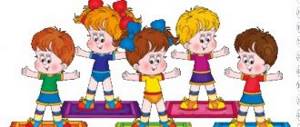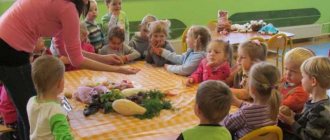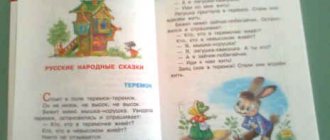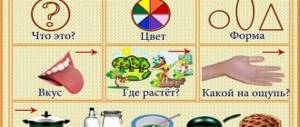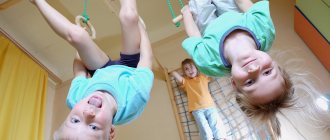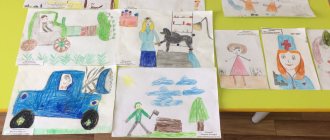“Book Week” in the senior group: planning
It is impossible to overestimate the impact that reading books has on literacy, replenishment of vocabulary, and expansion of a person’s horizons, especially in children at the preparatory stage of development.
“Book Week” at the preschool educational institution
For your information! It is easiest to develop an interest in new things in childhood, since children have the ability to vividly and sincerely experience, sympathize, rejoice, and be indignant, which manifests itself while reading a work of art.
Goals, objectives
The main goal of this project is to instill a love for reading books, teach children to respect them, and develop an interest in books through creative and educational activities.
During the implementation of this project, the following tasks are envisaged:
- To generate and maintain an interest in books and a love of reading, to cultivate a reader's taste and respect for books.
- Give children an idea of the types of books and literary genres.
- Familiarize children with all stages of book creation.
- To develop in children an understanding of the role of the writer, illustrator, and designer in the creation of a book.
- Explain to students the need and importance of libraries.
- Involve children, parents, and teachers in playing out stories from books.
Introducing kids to nature
Lexical topics
Every day of the calendar week it is planned to hold events (games, activities), presentations (speaking out abstracts and publishing notes in class) or thematic classes (communicating important information on a specific topic) on the following lexical topics:
- Monday. A walk around the native land. Acquaintance with nature through the works of writers Bianchi V.V., Prishvin M.M.
- Tuesday. Tanya, Yulechka, Petya and other heroes. Acquaintance with children's poetry through the works of Marshak S. Ya., Mikhalkov S. V., Agnia Barto, Tokmakova I. P., Mustai Karim.
- Wednesday. Travel to Buyan Island. Acquaintance with fairy tales and fables through the works of Pushkin A.S., Krylov I.A., Ushinsky K.D.
- Thursday. Walking around St. Petersburg. Acquaintance with the architecture, geography, life, climate of St. Petersburg through the poems of the poets A. A. Blok, Sasha Cherny.
- Friday. The Adventures of Bibigon. Acquaintance with the works of the writer Chukovsky K.I.
- Saturday. Dunno's friends. Acquaintance with the works of the writer N. N. Nosov.
Additional Information! Within each topic, children should be introduced to the biography and famous works of children's writers and poets, and a general description of their work should be given. Choose one of the plots in the works that most captivated the children, and role-play it with them.
Final event
The final event is that you should set aside time every day to make a book of your own composition and with drawings. At the end of Book Week, there will be an exhibition of books made by the children themselves.
Important! All events within the framework of Book Week must comply with federal state educational standards (FSES).
Solving math problems with preschoolers
Thematic weeks
Plan of events for Chemistry Week
at MBOU "Secondary School No. 14" in the 2015-2016 academic year.
Chemistry week at school is a special atmosphere, permeated with the spirit of creation, co-creation, and the desire to share one’s own discoveries with others; this is the expectation of something unusual, extraordinary and interesting...
Throughout the week, educational activities in chemistry are held in an accessible playful form, including for students in grades 1-5 who have not yet studied these subjects, the purpose of which is to awaken children’s interest in studying these subjects in high school.
Target:
- Stimulating the cognitive activity of schoolchildren in chemistry lessons and in extracurricular activities;
- Cultivating interest in the subject “chemistry”;
- Consolidating students’ ability to work in small groups, responsibility for the outcome of the work, teaching communication skills;
- Involving talented children in conducting chemical research and participating in Olympiads.
| № | the date of the | event title | Event participants | Responsible |
| 1 | Monday | Opening of the week. | 8-11 grades | Koroleva A.A., chemistry teacher |
| “Chemistry for children” (excursion to the chemistry classroom for students in grades 1-2) | 1-2 grades | Koroleva A.A., chemistry teacher, class teachers of grades 1-2 | ||
| 2 | Tuesday | Wall newspaper competition “In the kingdom of chemistry” | 8-11 grades | Koroleva A.A., chemistry teacher |
| Chemical quiz “Knowledge Auction” | 8th grade | Koroleva A.A., chemistry teacher | ||
| 3 | Wednesday | Mendeleev's drawing room "Let's get to know each other, chemistry!" | 8th grade | Koroleva A.A., chemistry teacher |
| Didactic game "Chemical Tournament" | 9th grade | Koroleva A.A., chemistry teacher | ||
| 4 | Thursday | lesson "Food hygiene" | 7th grade | Koroleva A.A., chemistry teacher |
| Open lesson “The trial of ethyl alcohol” | Grade 10 | Koroleva A.A., chemistry teacher | ||
| 5 | Friday | Class hour “Initiation into chemists” | 5th grade | Koroleva A.A., chemistry teacher |
| Presentation competition “Chemistry around us and for us” | 8-11 grades | Koroleva A.A., chemistry teacher | ||
| Intellectual game "World of Water" | Grade 10 | Koroleva A.A., chemistry teacher | ||
| 6 | Ceremonial summing up of the “Chemistry Week at School” | 8-11 grades | Koroleva A.A., |
Director of MBOU "Secondary School No. 14" I.A. Kostina
Chemistry teacher A.A. Queen
MBOU "Secondary School No. 14" held a subject week of chemistry.
Students from grades 1-11, a total of 169 people, took part in the Chemistry Week. The organizer of the chemistry week is chemistry teacher Alexandra Andreevna Koroleva. The work was carried out according to the chemistry week plan approved by the school director.
Chemical quiz competitions and excursions to the chemical laboratory were organized. One of the principles of holding chemistry week is the participation of all children. The second principle: “There are no losers, there are only winners—those who play, know and discover new, unknown, interesting, educational.”
All the activities carried out were of a pronounced nature and contributed to the formation of children’s interest in the subject of chemistry and a healthy lifestyle. Students of grades 8, 9, 10, and 11 showed the greatest activity in holding chemistry week. They were able to demonstrate their intellectual potential by taking part in the didactic game “Chemical Tournament”. During the activities, multimedia interactive tools and a chemical experiment were used. This increased the visibility of the events and the motivation for them. The week was interesting, creative, scientific. This was evident in all the events held.
The winners of competitions and quizzes were awarded certificates from the school administration. A well-organized and interesting subject week helps to enrich children’s knowledge, show their initiative and independence, and contributes to the development of individual qualities and the discovery of talents.
Topic of the week: Plant Kingdom
Goal: To introduce children to the diversity of plants. Learn to build cause-and-effect relationships, develop speech and thinking. Foster a caring attitude towards nature.
Final activities: Design of the album “Medicinal Plants”. Participation in the city competition “Save our nature”
Consultation for parents “Development of fine motor skills.”pdf; Consultation for parents “Dangerous neighbors, poisonous plants.”pdf; Consultation Scissors - safety rules.pdf; Memo reading.pdf
| Conversation with children on the topic “Plants”. Questions: What plants do you know? Which plant do you like best? What groups can all plants be divided into? Look at the illustrations. Goal: To foster interest in plants and respect for them. Pictures | Physical development. Program tasks: to practice the swing when throwing, the ability to quickly climb on your feet without hands without touching obstacles, to learn how to quickly gain speed when running. Develop agility and endurance. Equipment: balls, arcs. | Application. "Beautiful flowers in a vase" Program tasks: consolidate the ability to create a beautiful image in an application; practice cutting out different parts using a variety of cutting techniques: cut out identical parts from paper folded like an accordion, symmetrical parts from paper folded in half. Develop aesthetic feelings. Materials: colored paper, scissors, glue, brushes, oilcloth, napkins, albums. |
| Conversation with children on the topic “Plants of the Red Book”. What is the Red Book? Why is it needed? Why are some plants listed in the Red Book? What should be done to increase the number of plants? Goal: To expand children's knowledge about rare plants. Stories | Word game “I was born a gardener.” Goal: Develop speech and attention. "Forest and garden plants." Goal: To develop children’s speech, ability to classify and generalize. | Didactic games “Find out by description.” Goal: Develop thinking, attention, speech. “Which tree is the leaf from?” Goal: To consolidate knowledge about trees. " What's first, what's next." Goal: To consolidate with children the stages of plant growth from planting to fruit ripening; develop speech; develop an interest in plants. “Lay out the pattern.” Goal: To develop the ability to create a pattern of geometric shapes, to fix the names of the shapes and their colors. “Find out by description.” Goal: To consolidate children's knowledge about flowers and their appearance; develop memory, thinking, speech. |
| Reading fiction. V. Kataev “Flower - seven flowers”. Program objectives: teach children to listen carefully to a work of art, participate in a conversation about the content of the work, retell certain moments from the work; cultivate a caring attitude towards people. Material: book by V. Kataev “Flower - Seven Flowers”. | Modeling. “Cherry” Modeling Cherry.pdf Program objectives: teach children new methods of modeling (plasticine application), improve the ability to roll out thin ropes of uniform thickness; develop a sense of composition, the ability to draw a circle and an oval; cultivate interest in fine arts. Material: cardboard, plasticine, boards, stacks, napkins | Learn a poem by A. Tolstoy “ My bells...” Purpose: To develop intonation expressiveness of speech. My bells, steppe flowers! Why are you looking at me, Dark Blues? And what are you ringing about On a cheerful day in May, Shaking your head among the unmown grass? |
| Drawing. "Apple orchard". Program objectives: teach children to convey in a drawing the characteristic features of an apple tree in spring (structure, color); beautifully place the image on a sheet of paper; develop aesthetic perception and creative abilities. Materials: albums, paints, brushes, jars of water, napkins. | Physical development in the air. Program tasks: to train children in standing long jumps; in throwing the ball into the distance from behind the shoulder with one hand; develop the ability to run at speed: quickly pick up speed and maintain it until the end of the distance. Equipment : balls. | Conversation with children on the topic "Houseplants". Why are they called that? What are indoor plants for? What indoor plants do you know? Goal: Expand children's knowledge about indoor plants; cultivate a desire to care for them. |
| Speech development. Retelling the story. Ya. Tayts “For the berries.” Program objectives: teach children to listen carefully to a work of art, participate in a conversation about the content of the story, answer questions with complete answers, retell the story close to the text; develop attention, memory, speech; continue to learn to find the position of a sound in a word, to come up with words starting with a given letter. Material: the story of Ya Thai “By the Berries”; album "Learning to Speak". | Physical development. Program tasks: to train children in throwing bags into the distance, jumping rope, jumping high, maintaining balance; develop dexterity, cultivate mutual assistance. Equipment: hoops, bags, bells, jump ropes, baskets, ribbons. | Guessing riddles and reading poems about plants. Goal: To develop imaginative thinking. Poems about plants.pdf Riddles about plants.pdf |
| Cognitive development. "The Plant Kingdom" Program objectives: to bring children to an understanding that there is an amazing kingdom in nature - the world of plants, to introduce and justify the classification of plants as wild and cultivated (according to their relationship with humans). Develop curiosity. Foster a caring attitude towards nature. Material: illustrations depicting various plants. | Looking at the poster "What you shouldn't do in the forest." Goal: Clarify and consolidate the rules of behavior in the forest. | Conversation on the topic “Poisonous plants.” Objectives: To consolidate children's knowledge about safe handling of plants. Expand children's horizons. |
